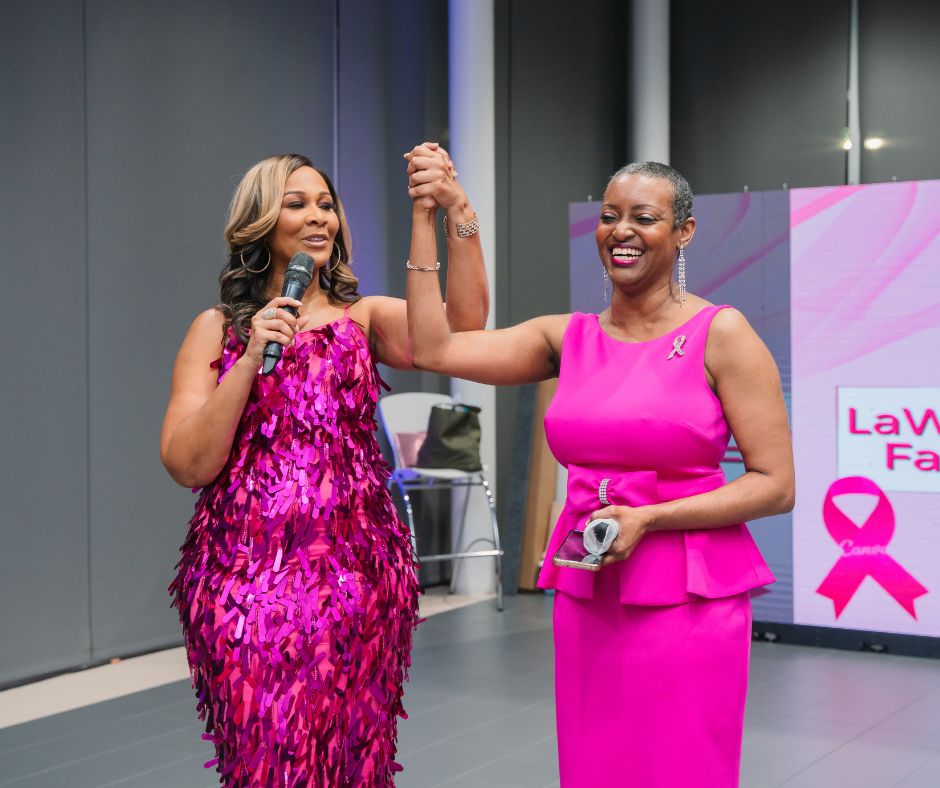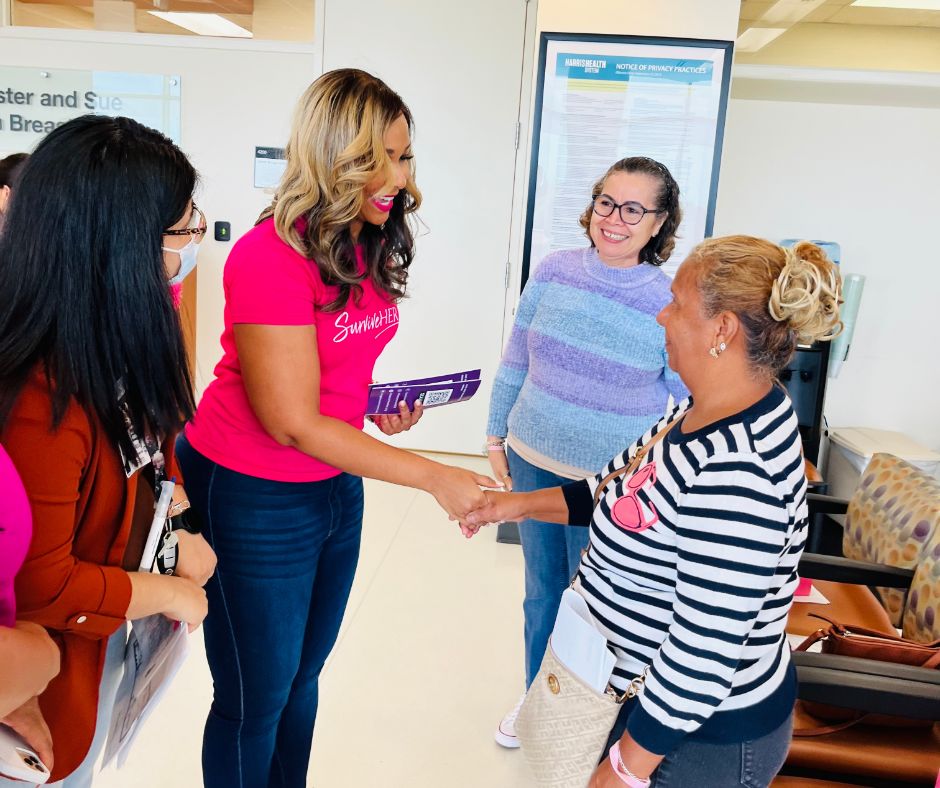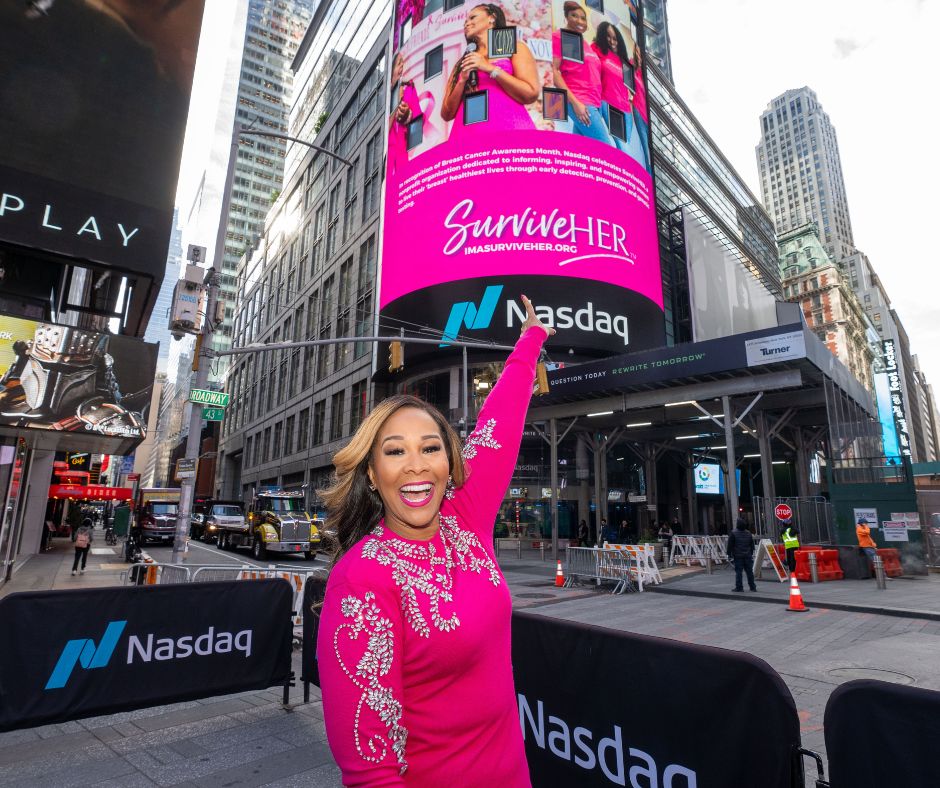Empowering Breast Cancer SurviveHers | Lyndsay Levingston
Meet Lyndsay Levingston, Stage IIB triple-negative breast cancer survivor, and founder of breast cancer nonprofit organization, SurviveHER. SurviveHER is a 501c3 organization dedicated to providing education, financial support, and resources to the breast cancer community.
What is your personal cancer journey?
Lyndsay: In July 2019, I lived in New York City with a career in media. I felt a tender, sore, large lump in my right breast while doing a routine self-breast exam. I knew something had to be wrong, and immediately scheduled a well-woman exam for my OB-GYN to check my breasts.
This comprehensive exam included my first mammogram. Since I had dense/fatty breast tissue, the doctor completed subsequent exams so the camera could fully penetrate the lump in my breast. By the end of this examination process, I had completed a traditional mammogram, 3D mammogram, and a breast ultrasound. Finally, a radiologist performed a biopsy on the lump. It was malignant - positive for cancer.
I was diagnosed with Stage IIB triple-negative breast cancer at 37 years old. Triple-negative breast cancer is the most aggressive subtype of breast cancer, and it affects Black women at a higher rate than any other population. Thank God for early detection! My doctor said that my prognosis was positive because my cancer had been caught early. I was proud of myself for feeling that lump and doing something about it right away, a small step that saved my life.
Once I received my diagnosis, I relocated back home to Houston and immediately began treatment.
My treatment plan began with neoadjuvant chemotherapy to shrink my tumor - 15 rounds of intravenous treatment to shrink the cancerous cells away. After this chemotherapy, my breast surgeon would perform a lumpectomy to remove the remaining parts of the tumor and tissue.
During the first few weeks of treatment, a cousin on my dad’s side of the family informed me of a family history of breast cancer. I decided to get a genetic test, and discovered that I carry the BRCA1 gene mutation. This mutation puts women at a higher risk for both breast and ovarian cancer. Thank goodness I received this information early in my treatment process, as my treatment plan changed even further due to this mutation.
My breast surgeon recommended that because of my mutation, I move forward with a bilateral mastectomy. This procedure would remove both breasts (and tissue), to hopefully reduce my chance of recurrence. After my mastectomy, I started immediate breast reconstruction. Tissue expanders, these heavy rock-like things filled with silicone, were placed under my skin to stretch and prepare it for permanent breast implants. Once I finished my mastectomy and reconstruction process, months later, I had a procedure to remove my ovaries and fallopian tubes to reduce my risk of ovarian cancer.
All of this happened so quickly. I was diagnosed with cancer in July 2019, and underwent 15 rounds of chemo from August to December 2019. I had four rounds of what’s commonly called the “Red Devil.” It’s a bright red chemical medicine that gave me fatigue, took my hair, and would have made me nauseous had I not been proactive with taking my anti-nausea medication often. But I call this chemo “The Blood of Jesus.” It’s what healed me! Then, I proceed with weekly treatments of Taxol. During those weeks, I regained my strength. I attended Zumba and kickboxing classes, staying active in whatever way possible to help the chemicals move through and out of my body.
Keeping active is so important and isn’t emphasized enough. Cancer doesn’t discriminate, whether you’re super active or not. But if you aren’t active, trying to regain strength after cancer is likely going to be more difficult. Nevertheless, every single baby step in a more active direction is going to help your body have a baseline of healing. The chemo kills the cancer but damages your body to do so, and you have to find ways to help your body heal.
After ringing the bell to symbolize completing chemotherapy treatment, I had a bilateral mastectomy in February 2020, breast implant surgery in July 2020, and the removal of ovaries and fallopian tubes in October 2020. Whew!
What are some of the physical and emotional challenges you faced on your journey?
Lyndsay: I would personally say that compared to others with cancer, I had a reasonable experience. I was healthy before my diagnosis and so my body had even more strength from which to pull when I underwent those difficult treatments. I didn’t experience significant physical challenges during my 15-month treatment journey.
Emotional challenges, however, were plentiful. I experienced such an emotional roller-coaster from breast cancer. I lost my breasts, ovaries, and fallopian tubes over a few months. What would this mean for my future? Luckily my breast surgeon showed a great deal of compassion. Before I even started chemo, this surgeon referred me to an oncofertility specialist to help preserve my fertility. I wouldn’t have even been able to think about a future and kids at the time, but my breast surgeon did everything for me. The fertility specialist harvested and froze my eggs before I started chemo.
Even though I have those eggs in the freezer, it’s still so hard emotionally to think about having kids. Would I get through this round of treatment? Will my cancer return? Would I die?
Even with those emotional challenges, I felt overwhelmed by positivity. A village of positive people and family surrounded me throughout my treatment journey. I prayed a lot and tried to focus on the good in life throughout the stressful treatment months. My breast surgeon told me that 90% of the struggle of getting through breast cancer is having mental fortitude, and that was so correct.
Where are you now on your cancer journey?
Lyndsay: No recurrences, praise God! People think that you’re done when you ring the bell to finish treatment and surgeries. Not true! My journey is now filled with managing side effects, survivorship, and just living day-to-day. I’m in medically induced menopause due to not having ovaries, so I experience the challenge of hot flashes and other effects from that. I take supplements every day to try to keep my body as balanced as possible. I try to stay active daily, even if all I can squeeze into my schedule is a morning walk.
In spite of it all, I’m in remission and thriving. I’m just so happy to be alive. You know how BC stands for Before Christ? For me, BC is ‘Before Cancer.’ I don’t know how I was living Before Cancer. Now, I’m living with purpose and have so much more clarity in my life. For that reason alone, I am grateful for my diagnosis. It propelled me into my true life’s purpose. Now, I have clarity on how to live, how to appreciate life, and how to embrace every moment.
What influenced you to create SurviveHer?
Lyndsay: I started SurviveHER to help me process my cancer experience and to help other women who are processing the same trauma of cancer. I identified a need for an organization that was accessible to women of color, especially young women of color with cancer. I wanted to share all the information that I learned through my own platform. Using my experience as a journalist, I’ve turned SurviveHER into my own news outlet to share stories and help others with cancer.
I have learned and am still learning so much about the effects and impact of breast cancer. I want to be able to share that education with other women. Originally, I planned for SurviveHER to be an Instagram Live series during the pandemic to interview other breast cancer patients and survivors. One of my dear friends encouraged me to take things to the next level, and now we’re here.
Once I expanded my horizons, I expanded what I wanted SurviveHER to offer to the cancer community. Financial support for women recently diagnosed with cancer was another resource I wanted to provide when I learned women need help during such a trying time. When I was first diagnosed with cancer, I wasn’t working. I understand what it’s like to be unable to work, but still need to pay bills or fulfill other financial responsibilities. This financial burden-lifting is another huge part of my advocacy work.
New opportunities continue coming my way to further SurviveHER’s work. It feels like God continues to reaffirm me in this important work. Prayerfully, I want to move into advocacy work full-time. This evolving industry has so many intricacies and nuances. There’s never a day where I don’t see new cancer research news or engage with a new community partner.
How does SurviveHer support the cancer community?
Lyndsay: Our arms are open to all women, we don’t discriminate. Because I am the face of SurviveHER, women of color reach out to us more often since they can relate to and resonate with my story. Any woman can apply for financial assistance for bills or treatment costs through our organization, and we are always looking to expand our financial assistance offerings.
Our largest advocacy work is through our organization’s community engagement component. We host events to bring both cancer survivors and those in active treatment together. SurviveHER creates a village of support for women going through breast cancer, and that is so important. There’s also always an educational component in our events, whether it’s a social activity or a workshop. If any woman is in need or has questions about breast cancer, SurviveHER is here.
Women are diagnosed with breast cancer daily. Our mission is driven 24/7 year-round. We’re not just focused on doing the work in October, but every single day.
What is your organization's main goal for the future?
Lyndsay: Our vision statement is “To become a global advocacy organization for breast cancer awareness.” We execute this mission through content, collaboration, and conversation. I’m looking to expand our partnership on the corporate level to bring SurviveHER into more businesses. We’re also looking to partner with pharma companies to offer patient experience as an aspect of their work.
SurviveHER is currently in talks with a cancer organization in St. Maarten. Women in the Caribbean really struggle with access to breast cancer resources and exams. The islands lack hospitals and clinics where a person could receive a mammogram or other diagnostic exam. We’re going to find a way to supply these medical needs by being a bridge between their organizations and the contacts we have for portable mammogram machines.
What would you tell someone who's recently been diagnosed with cancer?
Lyndsay: Take a deep breath. Pray about whatever your diagnosis is and turn it over to a higher power. Surround yourself with positive people.
Protect your peace. For me, I didn’t share publicly that I was going through breast cancer until everything was completed. I revealed my cancer experience as a birthday post on Instagram after most of my treatment was over. I wanted to protect my energy and protect what I was going through while processing this trauma.
Don’t try to do everything by yourself. Share with two or three trusted people. You’re going to need support. Being alone in the chemo suite is one of the hardest things to experience. Having someone there to hold your hand and sit with you while you’re going through it is priceless.
Educate yourself on your diagnosis. Try to be the best patient you can be to get to the finish line. Whatever the doctors told me to do, I did. I was an A+ patient, asking questions, following up, and staying on top of my health. You have to do what you can to help your body heal to the best of its ability. If you’re prescribed medication, set timers to help you remember to take it on time. If the doctor recommends that you increase physical activity, try to start going for walks or doing some simple yoga. Truly give your health your full effort.
Having cancer is a mental, physical, and emotional fight. Arm yourself with physical and spiritual strength, positive energy, and positive people. Trying to maintain a sense of normalcy was important to me. I would wear wigs and attend my regular Zumba classes, no one knew that I had breast cancer except those I chose to tell. Cancer is a huge life interruption, but there are some aspects of that interruption that I was able to control.
Every day that I am alive is a day that I am not dying. Keeping upbeat and focusing on healing helped me feel so much better. Positive energy made a huge difference in my journey.
Learn more about SurviveHER and reach out for support: https://imaSurviveHER.org/











Lyndsay Levingston is a multimedia personality, host, highly sought-after speaker, published writer, and philanthropist. Her vast portfolio includes experience as a television news anchor, reporter, host, and producer. Lyndsay was diagnosed with Stage 2B triple-negative breast cancer in July 2019 and deemed cancer-free in February 2020. In October 2020, she founded SurviveHER™, a thriving nonprofit whose mission is to inform, inspire, and empower a community of breast cancer SurviveHERs and supporters.